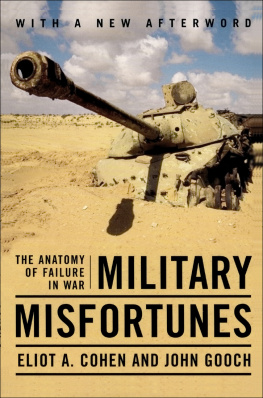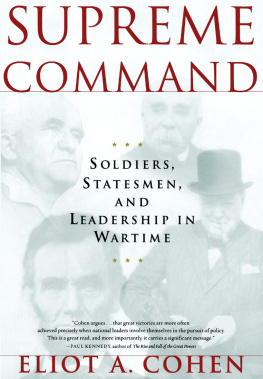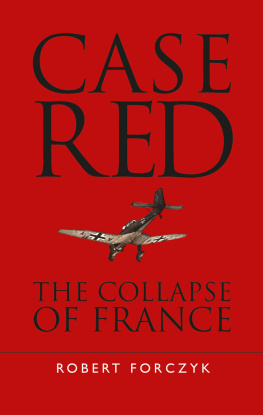Cohen and Gooch have done their job well. They have mastered their sources, used considerable imagination... the book is well-written and sound in judgment. Caspar Weinberger, The Wall Street Journal
WHY DO COMPETENT ARMIES FAIL?
Why did the American-led coalition in Iraq fail to wage a classic counterinsurgency campaign for so long after the fall of Baghdad?
Why was the sophisticated Israeli intelligence service so thoroughly surprised by the onslaught of combined Arab armies during the Yom Kippur War of 1973?
How did a dozen German U-boats manage to humiliate the U.S. Navy for nine months in 1942sinking an average of 650,000 tons of shipping monthly?
What made the 1915 British-led invasion of Gallipoli one of the bloodiest catastrophes of the First World War?
Since it was first published in 1990, Military Misfortunes has become the classic analysis of the unexpected catastrophes that befall competent militaries. Now with a new Afterword discussing Americas missteps in Iraq, Somalia, and the War on Terror, Eliot A. Cohen and John Goochs gripping battlefield narratives and groundbreaking explanations of the hidden factors that undermine armies are brought thoroughly up to date. As recent events prove, Military Misfortunes will be required reading for as long as armies go to war.
The general reader will find this a fascinating and informative book; those responsible for their nations security will find in it lessons they will ignore at their own peril.
Major General (Res.) Aharon Yariv, former director, Israeli Military Intelligence

F R E E P R E S S
Published by Simon & Schuster New York
Cover design by Todd Robertson
Cover photograph Corbis
Register online at www.SimonandSchuster.com for more
information on this and other great books.

ALSO BY ELIOT A. COHEN
Supreme Command:
Soldiers, Statesmen, and Leadership in Wartime


FREE PRESS
A Division of Simon & Schuster, Inc.
1230 Avenue of the Americas
New York, NY 10020
www.SimonandSchuster.com
Copyright 1990 by The Free Press
All rights reserved,
including the right of reproduction
in whole or in part in any form.
First Free Press paperback edition 2006
FREE PRESS and colophon are trademarks
of Simon & Schuster, Inc.
3 5 7 9 10 8 6 4 2
Library of Congress Cataloging-in-Publication Data
Cohen, Eliot A.
Military misfortunes : the anatomy of failure in war / Eliot A. Cohen, John Gooch.
p. cm.
Originally published in hardcover by The Free Press... New York, 1990T.p. verso.
1. Military art and scienceHistory20th century. 2. Military history, Modern20th
century. I. Gooch, John. II. Title.
[U42.C56 1991]
355.480904dc20 9050491
ISBN-13: 978-0-02-906060-5
ISBN-10: 0-02-906060-5
ISBN-13: 978-0-7432-8082-2 (Pbk)
ISBN-10: 0-7432-8082-2 (Pbk)
eISBN-13: 978-1-4391-3548-8
Thank you for purchasing this Free Press Books eBook.
Sign up for our newsletter and receive special offers, access to bonus content, and info on the latest new releases and other great eBooks from Free Press Books and Simon & Schuster.

or visit us online to sign up at
eBookNews.SimonandSchuster.com
Contents
4. Failure to Learn
American Antisubmarine Warfare in 1942
5. Failure to Anticipate
Israel Defense Forces on the Suez Front and the Golan Heights, 1973
6. Failure to Adapt
The British at Gallipoli, August 1915
7. Aggregate Failure
The Defeat of the American Eighth Army in Korea, NovemberDecember 1950
8. Catastrophic Failure
The French Army and Air Force, MayJune 1940
Preface
A BOOK ABOUT MISFORTUNE has emerged from what was, for us, a stroke of good fortune. In the autumn of 1985 we met as visiting faculty members in the Strategy Department of the U.S. Naval War College in Newport, Rhode Island. Following one of many heated but friendly informal debates about strategy and military history in Hewitt wardroomthe immediate subject was the Dardanelles campaign, about which see we decided to teach a seminar together on operational failure in war. More specifically, we decided to examine a dozen cases of what we label here misfortunesthat is, failures attributable neither to gross disproportions in odds nor to egregious incompetence on the part of the victim nor yet to extraordinary skill on the part of the victor. In short, we asked, Why do competent military organizations fail? After the seminar we came to the conclusion (endorsed by our students) that this question deserved book-length treatment.
Although we chose cases sufficiently close to our time to be recognizably modern, we quite deliberately refrained from including one from Vietnam. (To discuss that misfortune, we are more-than-ever convinced, would require not a chapter but a separate book.) We chose to look at the experiences of Western democracies, believing that the nature of a countrys regime shapes its military organizations in important ways. The origins and nature of (not to mention the penalties for) failure in, say, Sadam Husseins Iraq or Stalins Russia are very different from those one sees in free states; for in many, though not all, respects, military organizations reflect the societies for which they fight. To strike a balance between a narrow focus and a broader scope, we have looked at the experiences of four nations over a period of nearly sixty years. We considered and rejected many more cases than we include, for a variety of reasons. In some instances we concluded, upon reflection, that we were indeed dealing with failures born of incompetence rather than misfortunes; in others, we found that the evidence available was too scanty to permit a sober judgment.
We have divided our work evenly, Gooch writing the first drafts of and the last chapter, which are broader in scope than the intervening five case studies, underwent extensive rewriting, so that the result is very much a joint product. Unless otherwise noted, all translations from the French, German, and Hebrew are by us.
We have had the assistance and advice of many people, whose help we would like to acknowledge. We begin with our students Edward Colonna, William Dalecky, James Hagen, Joseph King, James Lasswell, David Lindauer, Patrick Saxon, Peter Scofield, Drake Trumpe, Anthony Veiga, and Stanley Winarsky. As is so often the case at the Naval War College, these officers from the U.S. Navy, Army, Marine Corps, and Air Force (and in this case a civil servant as well) had much to teach their nominal teachers. This would not be the same book without the benefit of their professional experience and judgment as well as their enthusiasm and insight; individually and collectively they demonstrated the high worth of the ethic of responsibility that we discuss in .
Our research took us to a number of libraries and archives, and we are grateful for the aid we got there. In particular, we would like to acknowledge our debts to the resources of the Naval War College Library, Newport, R.I. (Robert Schnare); the Naval War College Historical Collection, Newport, R.I. (Evelyn Cherpak); Harvards Widener Library; the Public Record Office, London; the University of London Library; the Liddell Hart Center for Military Archives, Kings College, London (Patricia Methven); the Imperial War Museum, London (R. W. Suddaby); the Jaffee Center for Strategic Studies, Tel Aviv; the Modern Military Records branch of the National Archives, Washington, D.C. (John Taylor and Richard Boylan); the MacArthur Memorial, Norfolk, Va. (Edward J. Boone); the U.S. Navy Operational Archives, Washington, D.C. (Dean Allard and Bernard Cavalcante); the U.S. Marine Corps Historical Center, Washington, D.C. (H. I. Shaw); the U.S. Army Center for Military History, Washington, D.C. (Alexander Cochrane); and the U.S. Army Military History Institute, Carlisle, Pa. (Richard Somers and John Slonaker). In addition, Eliot Cohen had generous and frank interviews , most notably Major Generals Aharon Yariv, Shlomo Gazit, and Israel Tal. Many others gave of their time, memories, and views but have requested anonymity, which in no way lessens our debt to them.
Next page

















